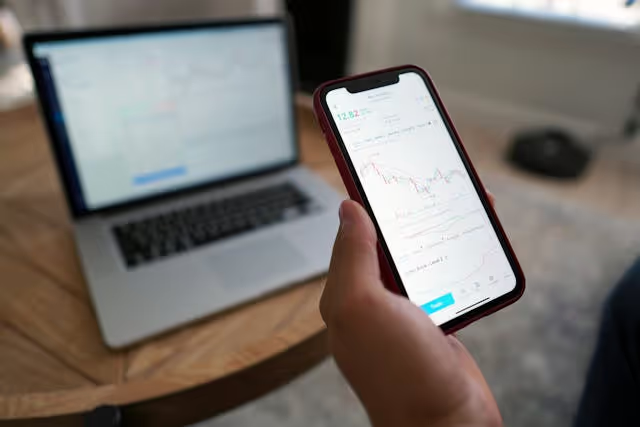
Blog
Trade or Invest? Choosing the Right Path for You
Trading and investing each have their own benefits, which could be right for you?
Investing and trading both involve buying assets with the goal of growing your money. Assets involved with investing and trading might include shares (stocks), commodities, property, and traders might also delve into areas such as foreign exchange and cryptocurrency.
Many people mistakenly consider trading and investing to be the same thing. Both involve using your money to potentially create wealth, but the practicalities differ significantly.
Trading and investing might sound like interchangeable words for trying to grow your wealth, especially in the stock market. But they mean different things — and come with their own set of risks and potential benefits. Knowing them can help you determine which one is best for your money and overall financial strategy.
Let’s take a closer look.
Defining Trading
Trading is buying and selling assets, like individual stocks, ETFs (an exchange-listed basket of many stocks and other assets), bonds, commodities, and more, in hopes of making a short-term profit. Traders could be buying and selling investments multiple times a day, week, or month. Though technically you "make a trade" anytime you buy or sell an investment, most people associate trading with an active investing strategy.
Trading might also encompass non-financial assets, such as certain types of property investment. For instance, if you buy a piece of residential real estate with the intention to fix and flip it (repair it then sell it for a profit) within a short timeframe, that is usually also considered a form of trading.
Defining Investing
Investing is buying an asset, like an individual share in a company, sum in a managed fund or KiwiSaver Scheme, exchange-traded fund (ETF), or even a piece of real estate, in hopes of increasing the overall value of your money over time. Because most people invest for long-term goals, like buying a house or saving for retirement, they tend to hold these assets for a long time — potentially decades.
Trading Versus Investing, The Differences
The key difference is in the timeline.
Investing typically involves holding onto an asset for years, if not decades. On the other hand, trading could mean buying and selling many types of assets within the span of minutes, hours, a day, a week, or months.
While timeline is the most fundamental difference between traders and investors, there are a few more. Let’s take a closer look.
Time and Effort
Because of the amount of research and transactions it takes, successful trading can be — and often is — a full-time job. Long-term investing, meanwhile, most often takes a set-it-and-forget-it mentality. There still might be plenty of research, but at its simplest investing can be very easy: by buying a diversified fund or mix of investments, investors may be able to benefit from the long-term returns of investment markets with little effort. This means the investor likely will experience all the ups and downs that the overall market experiences — but unlike traders, they won't respond in real time to market events hoping to edge out market returns. This hands-off approach of investing can pay off.
Complexity of Trading
Trading is characteristically complex due to its reliance on short-term market movements and rapid decision-making. Traders must navigate volatile markets, employ technical analysis, and remain vigilant to market news and economic indicators that can shift sentiment within moments. The psychological demands are substantial, requiring a balance of discipline and risk tolerance. Unlike long-term investing, where a buy-and-hold strategy mitigates many market fluctuations, trading demands a deep understanding of market mechanics, sophisticated strategies, and often, the use of advanced algorithms and tools to gain a competitive edge.
Complex financial instruments, including derivatives, structured products, and leveraged ETFs, add another layer of intricacy to advanced trading strategies. The use of these instruments demands advanced knowledge, careful analysis, and continuous monitoring, which makes them suitable primarily for experienced traders and sophisticated investors. These solutions are usually ignored by long-term investors, who instead focus on long-term growth and analysis of fundamentals.
Risk of Loss, Trading Versus Investing
Any investment carries a risk that you'll lose money. But buying and selling investments becomes riskier based on the shorter your holding timeline is, the more complexity you add, and the more you concentrate your money into just a handful of holdings, which are all characteristic of trading. Most major stock markets have historically recovered from every downturn they’ve experienced — but they haven’t always done so quickly or predictably. Recoveries can take years, meaning traders who purchase shares of stocks whose values fall may not have the time to wait out a rebound.
And while the broader stock market has recovered, not all company stocks have. Buying individual stocks, like many traders do, raises the risk that you could lose the money you invest. Diversified funds, meanwhile, spread your money across hundreds of companies. This helps smooth out any dips individual companies may experience by supplementing their performance with other companies' stronger returns.
In addition, to turn quicker profits, traders may purchase more complicated asset types, such as options, futures contracts, and swaps, as well as the use of margin—a type of loan that brokerages offer traders who agree to ante up assets they own outright as collateral. Although these techniques hypothetically may provide traders with higher potential profits, they also carry greater risks that may result in loss—and, in the case of margin trading, possibly even more.
Portfolio Representation
Due to the amount of risk involved, trading typically only represents a percentage of someone's total investments, not their entire portfolio or net worth. This allows traders to take on riskier bets without jeopardising their entire long-term financial future.
Trading Costs
Trading has several hidden costs, things that ultimately make it less profitable for most traders than sticking to an investing approach. Here are just a few:
- Trading usually operates what is called a zero-sum game. That is, if someone wins, it comes at the loss of someone else. For example, foreign exchange trading is essentially a series of bets between traders on the performance of a pair of currencies. If one trader benefits by $1,000 then another trader somewhere else has lost $1,000.
- Fees. Every time you transact, you run up hidden, or not-so-hidden, costs. If you’re using an online brokerage application (“app”) you’ll have to pay brokerage or some sort of margin on each transaction. If you’re transacting regularly, as traders do, these costs will soon run up to a substantial bill, regardless of whether you’ve made a trading profit or a loss. There’s a saying in gambling that “the house always wins”, which means the odds are stacked so that all-in-all, the casino always wins. The same applies here, except the casino is whoever traders are paying to transact. As investors don’t transact nearly so often, their fees are usually minimal.
- Taxes! Read on to learn more…
Trade or Invest, Tax Implications
At a high level, the New Zealand tax code treats ‘buy and hold’ investors more favourably than traders. Consider the following example:
- If you invest by buying shares in a New Zealand business for $1 million, then sell it in 10 years for $2 million, you’ll usually have no tax to pay, as New Zealand doesn’t have a capital gains tax. In other words, you get to keep $1 million in profits!
- If you trade by buying shares in a New Zealand business for $1 million with the intention to sell them soon, and do so in two weeks for $1.2 million, you’ll probably have to pay tax on the $200,000 profit at your marginal tax rate. Why? Because this would likely be considered trading, which is usually a taxable activity.
Tax is a complex area, far more complex than can reasonably be covered in a brief article such as this one! So, before launching or continuing any investment strategy, you’d be wise to seek professional advice from a suitably qualified tax adviser or accountant to ensure the full tax implications are known.
Similarities of Investing and Trading
At their most basic level, trading and investing could be called identical. This is because the goal for investing and trading is the same: to make money via assets. Both investing and trading involve assets, and both offer the chance for you to pick a wide range of investment types to help you reach your personal goals.
Meme Stocks, Characteristic Trading
A meme stock refers to the shares of a company that has gained viral popularity due to social media commentary. Online communities have on occasion dedicated heavy research and resources toward a particular company, often out of all proportion to that company’s current situation and future potential. The price of meme stocks can swing wildly. Though some suggest meme stock communities coordinate efforts to influence the prices of shares in selected companies, meme stock shareholders are often an unorganised set of independent individuals, each with their own investment views and preferences.
Meme stocks emerged in 2020 via a Reddit forum called r/wallstreetbets.
Collectively, the independent actions of these communities have been shown to initiate short squeezes in heavily shorted names. As a result, meme stocks can become substantially overvalued relative to fundamental technical analysis. Many are chronically unprofitable companies. The phenomenon around meme stocks is classic trading behaviour – a focus on short-term price movements rather than long-term potential.
Meme stocks have been a boon to investors, day traders, and brokerage platforms.
The Bottom Line: Should You Trade or Invest?
People often confuse investing and trading, using the terms interchangeably.
Can some traders consistently beat the market? Absolutely.
Despite this, there’s clear evidence to conclude investing is a strategy which works better for most people. Done right, it should take a lot less time, effort, and stress, too.
We would love to help you work through any of the topics mentioned above, to book your complimentary initial consultation get in touch today.
You may also like:

Should You Buy Land to Build a House in NZ?

The Media and Financial Markets


